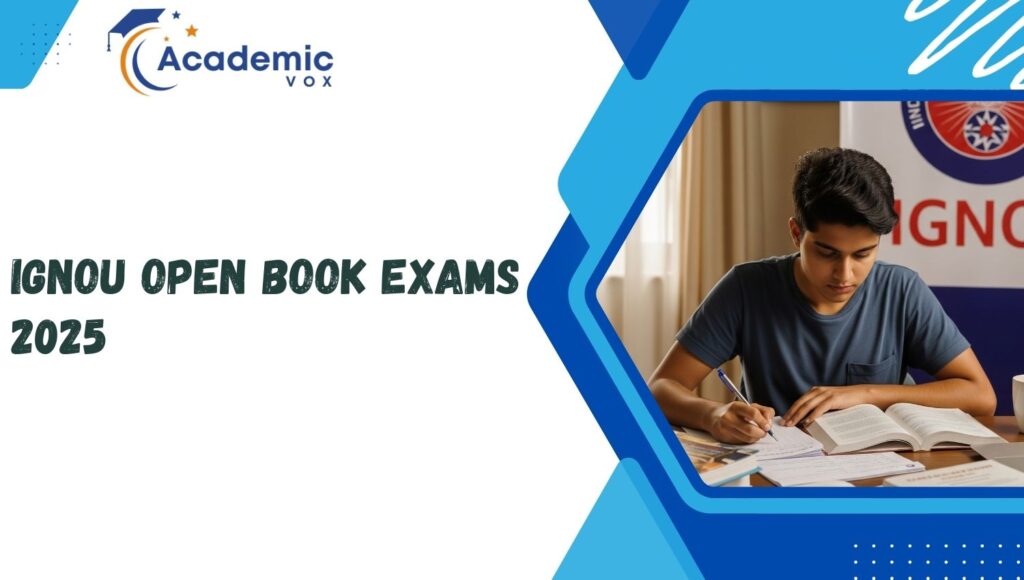
Introduction-IGNOU Open Book Exams
The Indira Gandhi National Open University (IGNOU) has always led the way in introducing innovation and flexibility to higher learning. With its enormous coverage in India and overseas, IGNOU keeps redefining distance education. One of the recent innovations that generated debate among students is the IGNOU Open Book Exam (OBE) system.
Many students are confused about how it works, what rules apply, and whether it is truly as “easy” as it sounds. Myths often overshadow the real picture, and this article aims to clear those doubts by explaining the truth about IGNOU Open Book Exams – myths vs. reality in detail.
Understanding the Concept of Open Book Exams
Open Book Exams are examinations in which students are allowed to carry their books, notes, or study material to the examination center (or use them while taking online exams). As opposed to regular closed-book exams, OBEs aim to evaluate a student’s understanding, analytical ability, and application of knowledge, not mere memorization.
Why IGNOU Implemented Open Book Exams?
- To promote conceptual clarity over mugging up answers.
- To accommodate examinations to the flexible learning approach of distance education.
- To provide a real-world style, where reference material tends to be applied in decision-making.
- To make exams more student-centered and less tense.
Common IGNOU Open Book Exams Myths
Myth 1: Open Book Exams are Easy
Most feel that since books are open, exams should not be difficult.
Reality:
Open Book Exams are usually tougher as they require critical thinking, problem-solving, and application of theories. Students cannot copy answers; they have to analyze and write in their own words.
Myth 2: You Don’t Need to Study for OBE
Some students believe they can simply flip through books during the examination.
Reality:
OBEs need proper preparation. If you have no idea where to locate important concepts or how to implement them, you’ll spend time looking during the examination. Time management is essential.
Myth 3: All IGNOU Exams are Open Book Now
There is misconception that IGNOU has converted all exams into the OBE pattern.
Reality:
All exams are not open book. IGNOU has given open book exams for certain programs and in unprecedented situations (such as during the COVID-19 pandemic). Traditional exams continue to be used extensively.
Myth 4: Copy-Paste from Books Will Award Full Marks
Students believe they can copy directly from the book.
Reality:
Examiners look for structured, analytical answers. Simple copying of book material without explanation can result in bad marks. Application and understanding are more important than memorization.
Myth 5: OBE Means Unlimited Time
Some think open book exams are longer or more flexible.
Reality:
The duration of the exam is no different. Students have to optimize time between searching material and writing good answers.
Key Realities of IGNOU Open Book Exams
- Critical Thinking is Assessed – The questions are meant to assess your ability to use knowledge, not merely memorize facts.
- Preparation is Still Essential – Knowing the syllabus, key areas, and book outline is important.
- Referencing is Helpful but Not Enough – Books are a guiding aid only, not the answer sheet per se.
- Plagiarism is Monitored – Particularly in online OBEs, copying text verbatim could result in penalties.
- Time Management is Important – Looking for answers wastes precious time; pre-prepared notes are strongly suggested.
How to Prepare for IGNOU Open Book Exams
1. Know the Syllabus
Mark important topics and concentrate on the most critical sections.
2. Set up Notes
Create compact notes, summaries, and mind maps in order to save time.
3. Practice Previous Papers
Attempt previous IGNOU question papers in OBE format to gain confidence.
4.Master Application of Concepts
Emphasize examples, case studies, and practical application of concepts.
5. Don’t Over-Depend on Books
Books are just guides. Your answers should be based on your knowledge.
IGNOU Open Book Exam Pros and Cons
Pros
- Less exam anxiety.
- Inspires better comprehension.
- Fosters self-study and analytical thought.
- More practical to professional life.
Cons
- Time-consuming if one is unprepared.
- Challenging for students who stick to bookish learning.
- Risk of poor grades if answers are copied word by word.
Expert Advice for Scoring High in IGNOU OBE
- Make short notes for speedy revision.
- Practice writing answers in your own words.
- Mark keywords in questions to remain on track.
- Provide examples wherever applicable.
- Keep your books well-marked with sticky notes or page markers.
Students’ Experiences – Myths Shattered
Some IGNOU students have revealed their experiences:
- Most students believed OBEs were more challenging than closed-book tests.
- Learners who used notes and conceptual understanding scored well.
- Students who used only books tended to lose out on time.
Future of IGNOU Open Book Exams
Although all exams need not be permanently changed to OBE, there is no doubt that IGNOU is experimenting with blended assessment models. A mix of classical exams, online submission, assignments, and OBEs can be the face of future distance learning.
Conclusion
The IGNOU Open Book Exam is not an “easy shortcut” to success. It is a developmental approach to assessment that challenges actual understanding and knowledge application. Breaking myths and knowing the truth, students can tackle OBEs with proper preparation and attitude.
Instead of fearing this system, embrace it as an opportunity to learn beyond rote memorization. If prepared well, OBEs can help students score better while also enhancing their analytical skills.
